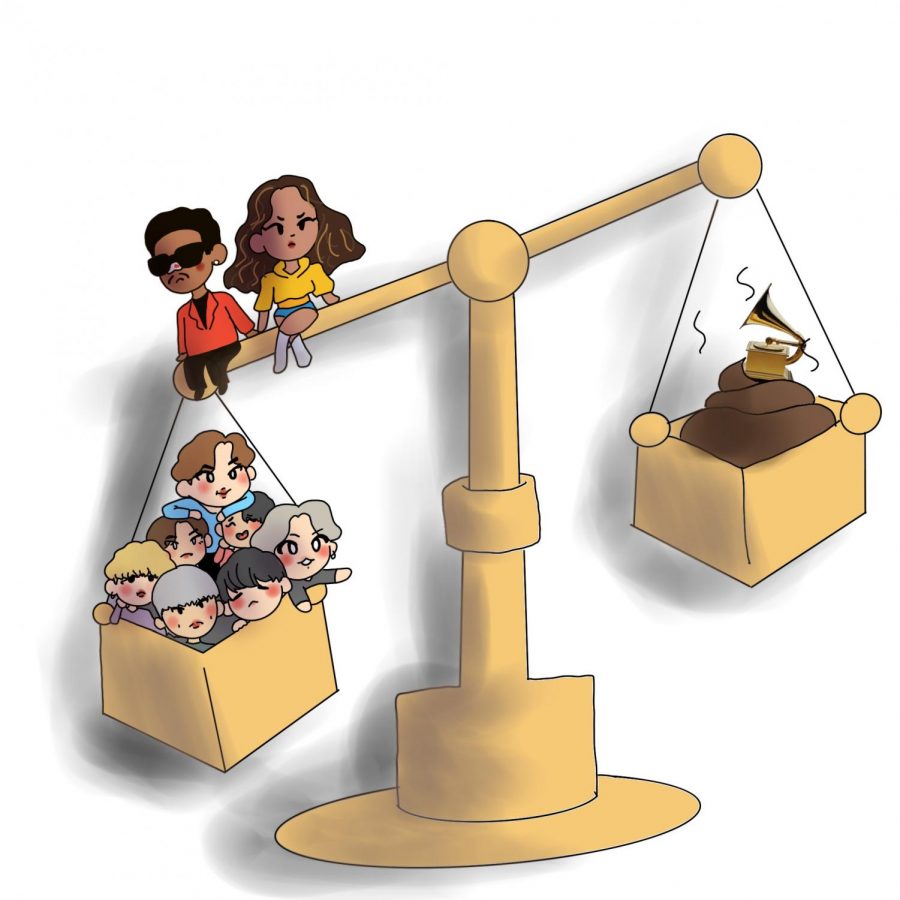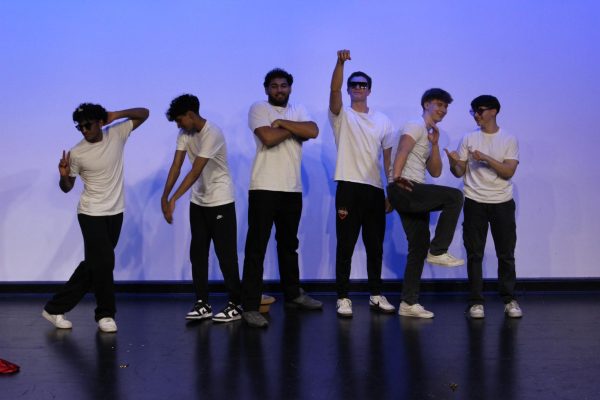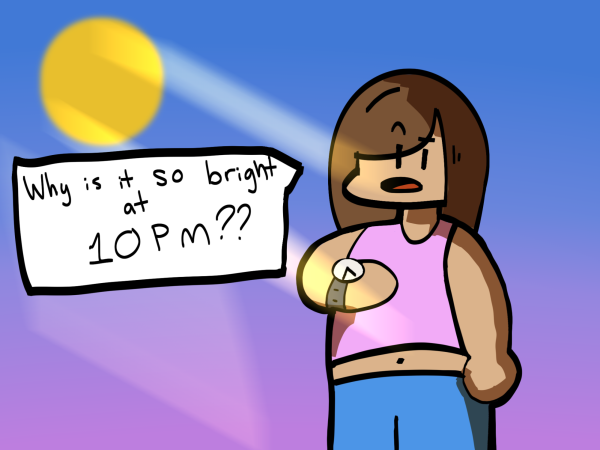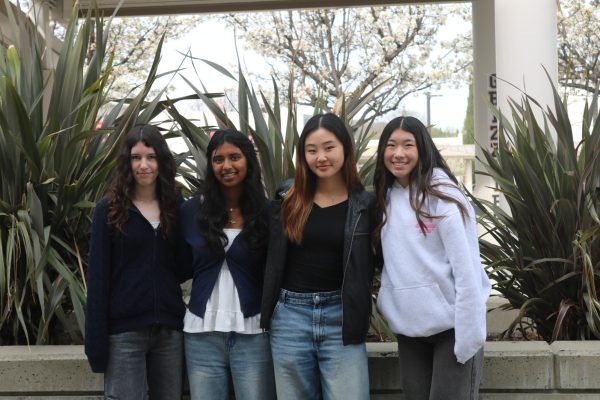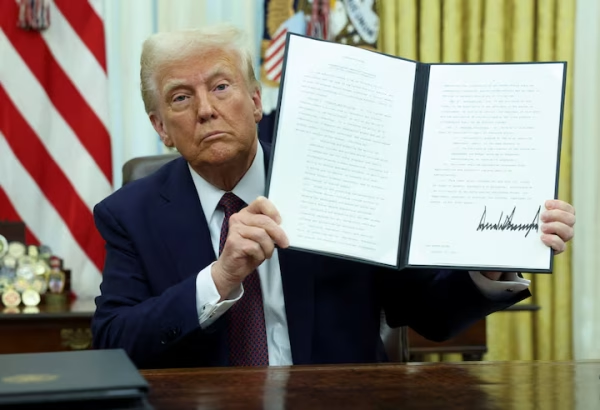The ‘Scammys’ are at it again
BTS snub is added to the growing list that clearly shows the Grammys racial bias
Minority musicians such as Korean group BTS have to work to work 10 times harder in order to receive the recognition they deserve.
“Let’s work even harder this year!”
These were the first words that BTS’s rapper, SUGA, shared with his fans after BTS did not win the Grammy earlier this month for Best Duo/Group Performance and it shows the perseverance and optimistic nature of the group.
But this is a harsh sentiment that is well too familiar to many people of color: the need to try 10 times as hard in order to gain half the recognition as their white peers.
The International Federation of the Phonographic Industry (IFPI) reported 2020 to be the biggest year for music in terms of revenue since 2002, largely due to a massive increase in streaming. The IFPI also named BTS and the Weeknd as the No. 1 and No 4 global recording artists of 2020, respectively.
Sadly, their impact doesn’t seem to be reflected by the Recording Academy.
The Grammys have a reputation for having an abundance of racial bias, making it harder for artists of color to succeed in the music industry. This award show can display their disclaimer about striving for equality and diversity all they want, but we all know that’s just bark and no bite considering the stuff they have and continue to pull.
Countless artists of color have been snubbed of their achievements, including Beyoncé, Kendrick Lamar, Nicki Minaj, Jay-Z, Frank Ocean, and the list goes on. Many of these artists have made their frustrations clear and have refused to participate in “Music’s Biggest Night” because of the unfair bias toward white artists.
This year’s show on March 14 was met with a lot of criticism and outrage after the Recording Academy failed to nominate Abel Makkonen Tesfaye, also known as The Weeknd, in any categories despite his huge successes over the last year. His song “Blinding Lights” was the top-selling single of the year and remained on top of the music charts for many months.
At least one nomination seemed guaranteed for such a huge accomplishment, but the Grammys thought otherwise.
After this year’s snub, The Weeknd has made it clear on his social media that he will no longer take part in such a biased award show from now on, joining many others who have made a similar decision.
“The Grammys remain corrupt,” The Weekend tweeted. “You owe me, my fans, and the industry transparency.”
Zayn Malik is another artist of color whose work in recent years has undoubtedly demonstrated both statistical achievements as well as artistic prowess. While his most recent works were not eligible for this year’s awards, Malik still shared his frustration and anger online as well.
“@Recordingacad are moving in inches and we need to move in miles. I’m keeping the pressure on & fighting for transparency & inclusion. We need to make sure we are honoring and celebrating “creative excellence” of ALL. End the secret committees,” Malik tweeted.
Despite the Recording Academy’s focus on “creative excellence”, it’s no secret that artists whose music is primarily in any other language other than English have a tough time winning a gramophone. In 2017, the Spanish hit “Despacito” joined the long list of snubs that the Grammys have committed. It was undeniably the biggest song of the year, but it failed to win any of the awards that it was nominated for, meaning the song was robbed not once, but three times.
The most current example would be when the Recording Academy disregarded the Korean works that the South Korean group, BTS, submitted. They submitted their album “Map of the Soul: 7” which comprised many amazing songs, performances, and art. But the only English song they had on their entire discography, “Dynamite”, was the one nominated for a lesser-acknowledged category, Best Duo/Group Performance.
If voters or whoever were in charge of choosing the nominations truly thought “Dynamite” was the “peak” of these guys’ talent and artistry, then should they even be in the position to be voting on what’s really the best of the best? I mean, “Black Swan” was an option but “Dynamite” was the one they picked? If one wants to make an argument about quality, not numbers, being the reason that a piece should win, then this decision discounts that entirely.
Considering the nomination was for best performance, it seems shocking that a song that was only performed once beat out a song that had more than 35 unique performances, ranging from renting out planes and airports to performing as the first Korean act to appear on MTV Unplugged.
But the flaw does not reside in these two amazing artists, but rather the system itself. After awarding Lady Gaga and Ariana Grande the Grammy for their collaboration “Rain on Me,” the Recording Academy still brazenly used BTS’s clout by placing their performance second to last in order to try to squeeze out as many views as they could, all while constantly teasing that they’d be up next.
In the week leading up to the Grammys, the Recording Academy tweeted about BTS’s nomination and performance several times, building anticipation for their appearance. But the Recording Academy only tweeted about the actual winners of the award.
The disrespect for that night didn’t stop there though.
Topps, a collectibles manufacturing company, released several cards of artists who appeared on the Grammys as “cute” and “quirky” caricatures in their parody series “Garbage Pail Kids”. But BTS, the one Asian act, was depicted as whack-a-moles beaten up during a time where anti-Asian hate is on an all-time high. Incidentally, on the day of its release, three Asian spas in Atlanta were targeted by a white male shooter and six of the eight victims were Asian.
Not only was the beaten-up imagery just outright insensitive and cruel, “whack-a-mole” has often been linked to anti-Asian and anti-immigration policies. After fans and many members of the Asian community showed their outrage, the company withdrew the card and apologized but failed to recognize the true problem of their design: the racist and xenophobic message behind the image.
Despite all of this, BTS still remained positive and their immediate response was to express gratitude for their fans and the opportunity. Their leader, rapper RM, reminded their fans on a livestream that despite what the media may push, the night was by no means a failure. The award would have just been a bonus to an already historic achievement: the band’s nomination and performance, which was the first by an Asian act on the Grammys stage.
BTS walks away from the Grammys untouched. Their success remains unparalleled and untarnished by a loss. In fact, BTS seems to have made more noise by losing the award. Despite being nominated for a minor award that was announced in the pre-awards show, not even the actual show, BTS was tweeted about more than 4 million times that night. That’s more than four times than the entire rest of the Grammys combined.
As Forbes wrote, “As BTS continue smashing records, and the Grammys continue to lose relevance, who really needs who?”
It is evident that the entire music industry, let alone the Grammys, heavily relies on artists of color. From nominating them for several categories only to not awarding them to shoving their performances to the very end for views, the award show is not discrete on their exploitation adventures. Many R&B performances were disrespectfully shoved into the pre-show while acts such as BTS, Roddy Rich, Lil Baby, and Doja Cat were saved until the very end to try and keep viewers anticipating.
Despite the Grammy’s attempts at being more “diverse”, this year’s show had the lowest views in history because, at this point, people are sick and tired of the Grammys giving awards unjustifiably.
So many people of color are major contributors to today’s music industry. If the Recording Academy continues with this downhill slope of systemic racism and xenophobia, then they will simply lose all credibility and respect.

Michelle Nguyen is a senior at Cal High and is features editor for the Californian Newspaper. She’s also the publicist for Cal High Interact, Interact...
